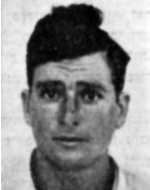Rabinowitz, Raphael (Rafi)
Son of Yenta and Eliezer was born on March 5, 1924 in Constantinople to his father who came from Romania to Turkey on his way to Israel, and to his mother, who was born in Turkey. Rafi was two weeks old when he and his parents immigrated to Israel. Luck was not welcome. The father was killed in the accident and the mother and her two children moved to France, lived in the village, and lived a difficult life there. One day his father’s uncle arrived on his way from California to Palestine. When he saw the situation of the family, it touched him and he took with him the three-year-old Rafi. In Israel his uncle established a family, he had three children, and Raphi was brought up together with them. He also did not find his place in the uncle’s house, and when he grew up, he was sent to an English school in Jerusalem whose director wanted to transfer him to the Christian faith. He was therefore removed, studied in a “cheder” and later taken to an elementary school in Haifa. These shaking from one school to another severely damaged the boy and his education. A year later, the family moved to Petah Tikva, where Rafi studied at the Gymnasium until his uncle died and he was forced to go to work. At first he worked in Kfar Sirkin and later moved to the framework of an urban youth hostel in Tel Aviv. On the day he worked as a locksmith and in the evenings he visited evening classes of Hanoar Haoved. The desire for learning returned to him and the boy recovered. With the worsening of the security situation in Israel, he became a member of the Palmach, trained in Negba, worked in the orchards and gained the appreciation of his friends as a laborer and a sportsman. Rafi set up a family in Israel, living in a very difficult place and suffering Lev attacks, but he could not lie in bed, and occasionally he would get up and go to the fields to plow, and once he returned with the plow and his girlfriend went to the field and found him unconscious. The kibbutz left him and moved to Kfar Shmaryahu, where he worked as a metalworker He was drafted into the army on March 3, 1948, and his wife was waiting for the birth of their son. In December 1948 he went down with the brigade to the south. During Operation Horev, a “liquidation” operation was carried out against the “Faluja pocket,” in which an Egyptian brigade was besieged. The attack took place on the eastern flank of the “pocket” in the area of Iraq-al-Manshiyya. The Alexandroni forces broke into the village from the south and took over part of it, but their assault on the hill north of the village was repulsed. Meanwhile, the Egyptians recovered and attacked and forced our forces to withdraw. Part of the force was trapped inside the village. In this battle, on December 28, 1948, an enemy grenade fell. In his last moments he had managed to cut the fence to which he crawled and call his friends to move forward. He was buried in Faluja. He left a wife and son, Amitzur, four months old. After a while he was laid to rest in the Nahalat Yitzhak Military Cemetery.
